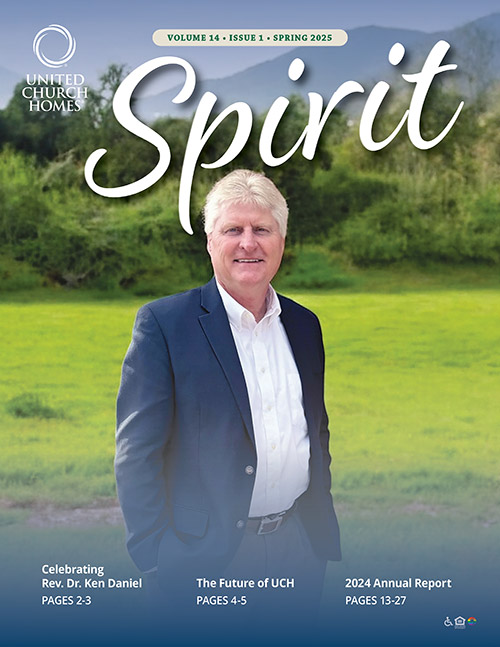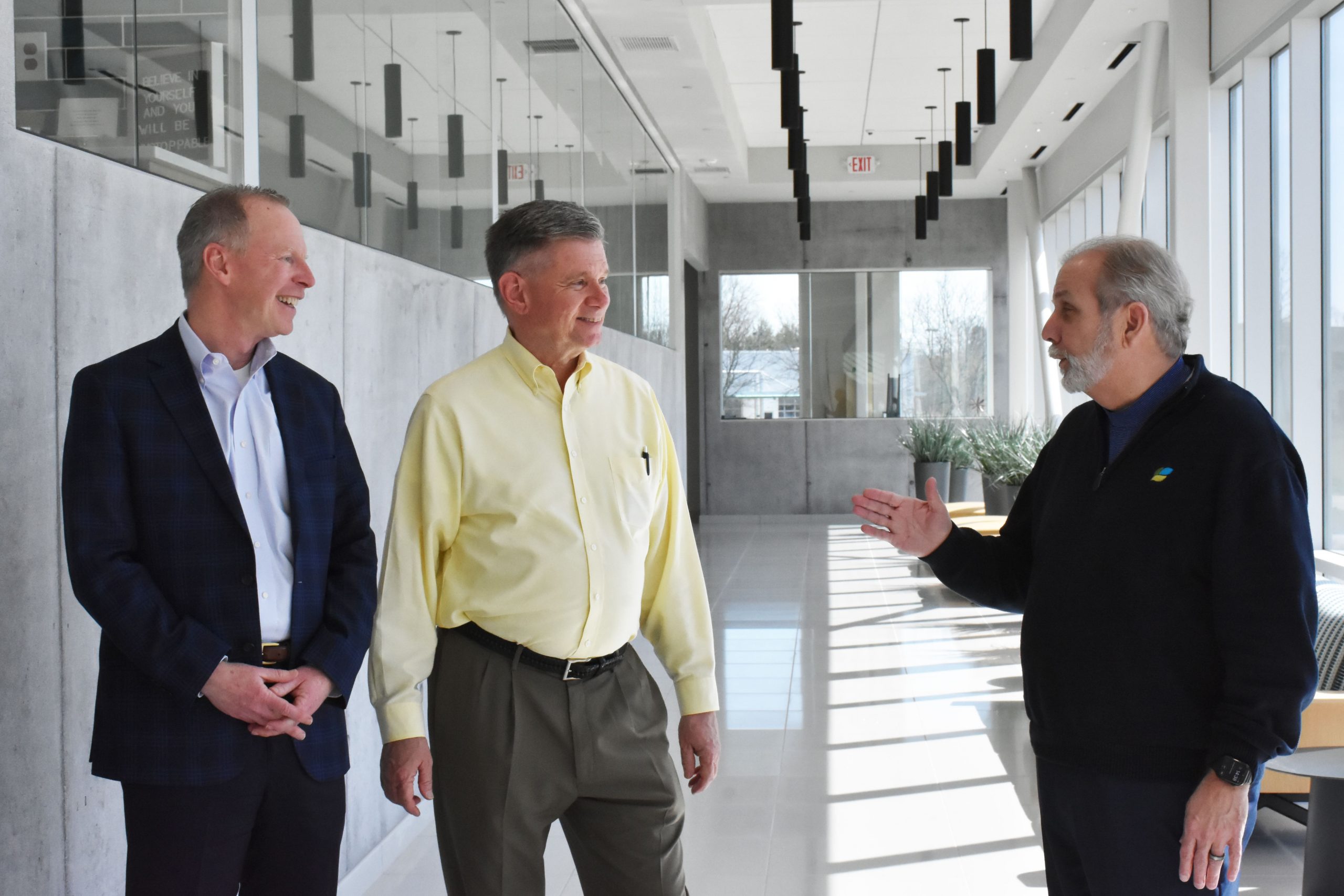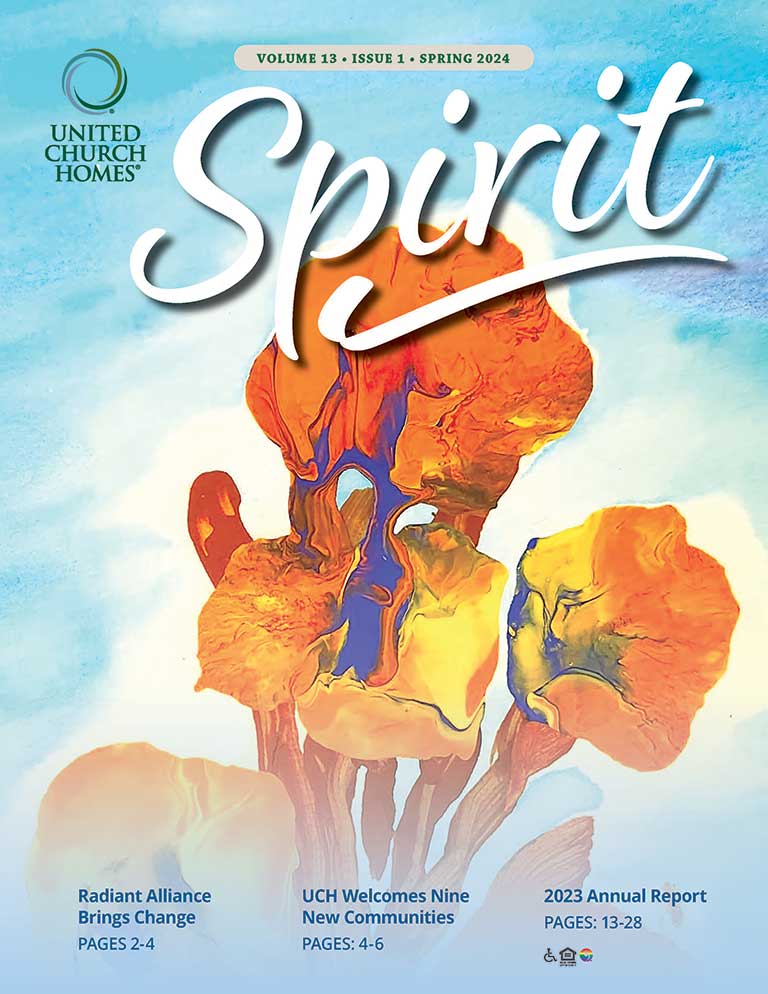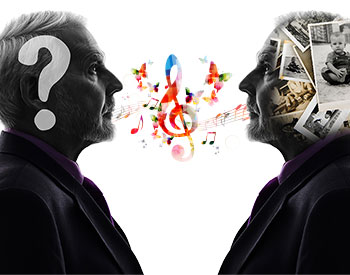
For the past year, United Church Homes has been a certified partner with Music & Memory, a nationally recognized program that encourages providing personalized music playlists to residents suffering from Alzheimer’s and related dementia. Music & Memory served as a centerpiece of UCH’s recent Centennial Celebration, with a third of the agenda dedicated to this innovative program, and the possibilities associated with using music to help create abundant life for others.
The Centennial featured a screening of the film, Alive Inside, which chronicles the voyage of discovery taken by Music & Memory founder Dan Cohen as he sought to understand the impact of music on Alzheimer’s residents. In addition, Music & Memory Regional Director Robin Lombardo delivered a featured presentation on why such a simple approach can be so powerful, and on what the future might hold for this alternative.
The underlying premise of Music & Memory is straightforward — each one of us has memories that we strongly associate with specific songs. With Alzheimer’s disease, which is characterized by the progressive death of brain cells that cannot be prevented or reversed, the playing of music can help an afflicted person temporarily become re-engaged and animated. In some instances, the effect is stunning.
“Music can bring you to a place of self — so you can find yourself again. Music is part of the tapestry of our DNA,” Robin said. “It is part of every cell in our body. It cannot be ignored.” Considering the impact that music can have in helping connect to the world, it’s a wonder this approach had not been discovered long ago.
“You are angels — the ones who create sacred space,” Robin said. “When you see a resident’s eyes light up, when they’re fully and completely engaged at that moment, it is music that is sparking their memory. The music is synchronizing itself with the neurons of the brain. It is reorganizing in such a beautiful way that this person is becoming alive. What a divine gift.”
The screening of the movie, Alive Inside, at the Centennial Celebration elicited a wide range of responses by those in attendance. The reactions of UCH staff after watching the film were both joyful and tearful, fueled by emotions that simultaneously created new energy and became a driving force for innovation, as attendees asked themselves how they could use music to unite and empower a community.
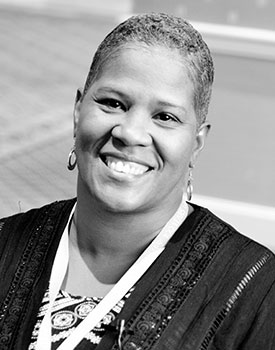
Maxine doesn’t have Alzheimer’s residents living in her community, but she recognized that music touches people on an emotional level, which had her thinking of ways to bring more music to her community. Having it play quietly in the lobby will no longer suffice. Bring in more musicians, more singing groups, and more church choirs. She vowed to bring the power of music to connect her community.
Melba Osburn, housing manager at Barrington Square in Acworth, Georgia, apologized for her raw emotions. With tears streaming down her face, she explained that the film reminded her of the time spent with an aunt who suffered from Alzheimer’s. Melba often played her aunt’s favorite songs on a small radio in her room. After watching the film, Melba realized she’d given her aunt a final gift before she passed. She kept the power of music in her aunt’s life.

“Alive Inside is a great film to support the Music & Memory program, but not everyone is going to have results like you see in the film,” said Beth Montgomery, admission coordinator at Fairhaven Community who also coordinates the Music & Memory program for the entire organization. “What we’re finding is that iPods are also working really well for skilled nursing residents, or for those with only mild confusion. The music helps with socialization, combats loneliness, and soothes those who may be agitated.”
While Music & Memory was not specifically created for a broader senior population, the inclusion of music into all aspects of resident life is generating benefits. UCH is discovering that music is not only for headphones and not only for those in memory care.
UCH communities are now playing music in alcoves and activity areas, in therapy gyms and dining rooms. Staff has discovered that music in the shower can relax residents. Music may be the essence of abundant life, helping residents in every facet of their everyday lives, and giving them a sense of personal connection, with or without headphones, inside or outside of the memory care unit.
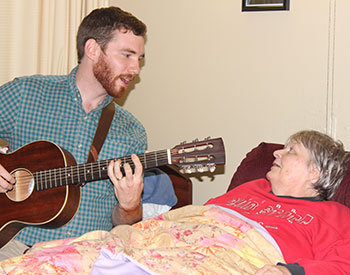
As a musician — an accomplished guitarist, pianist, and percussionist who’s involved in jazz bands and the music ministry at his church — Howard observed the impact of Music & Memory, and quickly recognized that music could benefit anyone and everyone. Today he’s working for UCH to extend his efforts to three new communities — Chapel Hill, Four Winds, and Parkvue — to his original assignment. He spoke about his moments of transformation.
He was working with Dolly, who has multiple sclerosis, an unpredictable and disabling disease of the central nervous system. He offered her an iPod and headphones so she could listen to her own music, but Dolly refused. She had never worn headphones and felt it would be rude to other residents. Howard connected her iPod to play through speakers in her room. While she still listens to her personalized playlist, the music provides background as she goes about her day.
“Dolly’s music inspires other residents to gather near her room so they can hear her music,” said Howard. “It has brought people together and created community, and she invites others to sing and dance. It’s really something to see.”
Howard also observed the impact of music on another resident, a man in his 50’s who was in a semi-comatose state due to brain trauma. He was unresponsive to various stimuli. He could move his hands or track with his eyes, but he did not speak. Howard experimented with some songs to see if he could induce a response when other efforts had failed. When Howard played rock music by the band AC/DC, the man spoke for the first time, vocalizing to indicate he liked a specific song.
Finally, there’s the situation of Rev. Ralph Quellhorst, a Kroft Commons resident at Chapel Hill, who also does not have Alzheimer’s. He lives with Parkinson’s disease, which has robbed him of the ability to speak clearly and to fall asleep easily at night. But Ralph was provided with an iPod to improve his mood and decrease restlessness. He takes the iPod everywhere, as music soothes him in a way unlike anything else.
While he cannot speak clearly, others have witnessed what can only be described as amazing. When the alma mater for his beloved Heidelberg University is played, Ralph’s voice rings out loud and clear and beautiful. He also continues to sing in his church choir the hymns that have been a part of his entire life. It is music which gives him his voice back.
Such is the power of music.
View all articles by:

 “Music can bring you to a place of self — so you can find yourself again. Music is part of the tapestry of our DNA,” Robin said. “It is part of every cell in our body. It cannot be ignored.” Considering the impact that music can have in helping connect to the world, it’s a wonder this approach had not been discovered long ago.
“Music can bring you to a place of self — so you can find yourself again. Music is part of the tapestry of our DNA,” Robin said. “It is part of every cell in our body. It cannot be ignored.” Considering the impact that music can have in helping connect to the world, it’s a wonder this approach had not been discovered long ago.